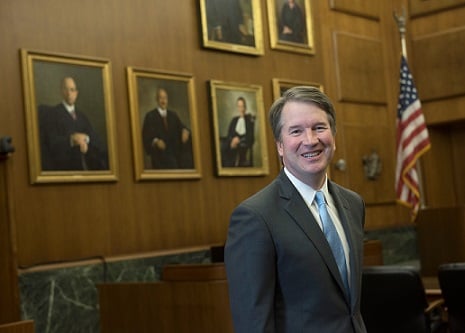A Stanford affiliate may have played a role in connecting Dianne Feinstein ’55, the senior Democrat on the Senate Judiciary Committee, with a letter alleging past sexual misconduct by Supreme Court nominee Brett Kavanaugh, multiple media outlets report.
Details of the letter surfaced Friday in coverage by The New Yorker, which said the letter accuses Kavanaugh of assaulting a woman during a high school party in the early 1980s. The letter reportedly says Kavanaugh and a classmate — both of whom had been drinking — played loud music in a bedroom to drown out a woman’s protests while Kavanaugh attempted to force himself on top of her, before she eventually escaped.
Kavanaugh denied the allegations entirely, The New Yorker reported, and the letter itself has not been made public.
“I have received information from an individual concerning the nomination of Brett Kavanaugh to the Supreme Court,” Feinstein said in a statement on Thursday. “That individual strongly requested confidentiality, declined to come forward or press the matter further, and I have honored that decision.”
Accounts of how Feinstein came to possess the letter remain clouded.
The New York Times reported Thursday that the letter was given to Feinstein in July by 18th Congressional District Representative Anna Eshoo. The 18th District includes Stanford, and — according to a Wednesday report by The Intercept — Eshoo received the letter from a Stanford affiliate, who reportedly wrote it based on information provided to them by a fourth party.
However, The New Yorker instead cites a source close to the woman in the letter as saying that this woman sent the letter directly to the offices of both Eshoo and Feinstein.
The New Yorker article does not mention a Stanford affiliate. However, a subsequent article published Friday by Politico does, and specifies that it was a Stanford Law School professor.
Stanford Law Professor Michele Dauber — an advocate for sexual assault victims who garnered widespread attention for her role in the successful campaign to recall former superior court judge Aaron Persky ’84 M.A. ’85 — said she had no knowledge of an affiliate beyond media coverage.
“I was not involved in any letter to anyone and don’t know anyone who was,” Dauber told The Daily.
Debra Katz, an attorney known for her work with #MeToo survivors, is representing the woman in the letter, The Intercept reported. When asked by Buzzfeed News about her involvement in the matter, Katz said there was “nothing to say.”
A spokesperson for Kavanaugh’s former high school, Georgetown Preparatory School in Maryland, told CNN that the school has “no knowledge regarding any accusation” against Kavanaugh related to his time at the school.
Feinstein referred the matter to the F.B.I. on Thursday, after discussing — but not sharing — the letter with Judiciary Committee Democrats Wednesday. An F.B.I. official told The Times that a criminal investigation has not been opened in response to the letter.
The F.B.I., which conducts background checks on all Supreme Court nominees, added the letter to Kavanaugh’s background file on Thursday, giving the White House access. Other senators may also now have access to the letter, The Times reported.
The timing of Feinstein’s actions — months after she allegedly received the letter — drew criticism from the Trump administration, which dismissed discussion of the letter as a politicized attempt to derail Kavanaugh’s confirmation.
“Not until the eve of his confirmation has Senator Feinstein or anyone raised the specter of new ‘information’ about [Kavanaugh],” said White House spokesperson Kerri Kupec.
Judiciary Committee Chair Charles Grassley, the Republican senator who set the timeline for Kavanaugh’s confirmation, reportedly received a copy of the letter after its inclusion in Kavanaugh’s background file. However, a spokesperson for Grassley told The Times that the senator had not yet viewed the letter and had no plans to delay Kavanaugh’s confirmation vote.
The Senate is set to vote on Kavanaugh’s confirmation next Thursday, Sept. 20.
This report has been updated to reflect new details regarding the alleged contents of the letter and the status of the alleged Stanford affiliate, as well as discrepancies between different media outlets’ coverage of the story. The Daily will include additional details as they come to light.
Contact Brian Contreras at brianc42 ‘at’ stanford.edu and Holden Foreman at hs4man21 ‘at’ stanford.edu.
